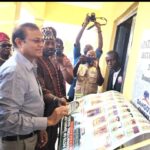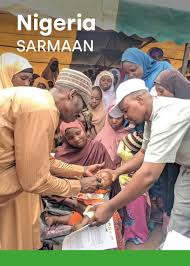By Vivian Ihechu and Kevin Okunzuwa, News Agency of Nigeria (NAN)
For generations, mothers like Hannatu Bello in rural Nigerian communities such as Kura, Kano State, have faced the heartbreaking reality of high infant mortality.
While her friend, Talatu Bako, mourns the loss of two children to infections, Bello sees a glimmer of hope.
“Before, my child was always sick,” she says. “Now, everything has changed.

The rustic environment in which the people live reflects a simple, traditional lifestyle

That change stems from the Safety and Antimicrobial Resistance of Mass Administration of Azithromycin Among Children (SARMAAN) project.
Azithromycin is a broad-spectrum macrolide antibiotic that works by inhibiting bacterial protein synthesis, stopping bacterial growth. It’s commonly used to treat respiratory infections, diarrhea, and other childhood illnesses.
Launched in line with the World Health Organization’s 2022 guidelines, SARMAAN is a Federal Government-led research initiative with roots in a surprising observation.
Communities in northern Nigeria using azithromycin for Neglected Tropical Diseases (NTDs) like onchocerciasis and schistosomiasis were experiencing unusually low infant mortality rates.
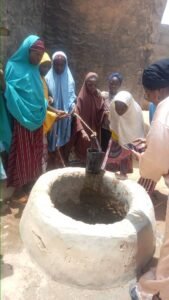
*The only source of water supply in the community is from a well.
These diseases, affecting the rural poor, had been routinely treated with mass administration of azithromycin.
Researchers at the Nigerian Institute of Medical Research (NIMR) confirmed the trend through fieldwork and reviews.
Although the exact mechanism is still being studied, experts believe azithromycin’s effectiveness against common childhood infections, especially respiratory and diarrheal illnesses, plays a crucial role.
A national response to a public health crisis
With Nigeria’s infant mortality rate standing at 63 deaths per 1,000 live births (According to the 2023/24 Nigeria Demographic and Health Survey (NDHS), the government tasked NIMR with evaluating and implementing the WHO’s recommendations.
Funded by the Bill & Melinda Gates Foundation, SARMAAN is led by NIMR with support from the Federal Ministry of Health and partners such as eHealth Africa (data) and Solina Group (service delivery).
Phased rollout: From research to scaled impact
Phase 1 focused on safety and monitoring antimicrobial resistance (AMR) across six diverse states: Akwa Ibom, Abia, Kebbi, Kano, Sokoto, and Jigawa. Eligible children received azithromycin every six months.
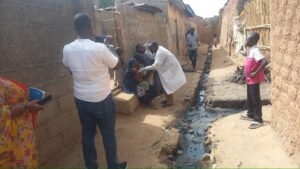
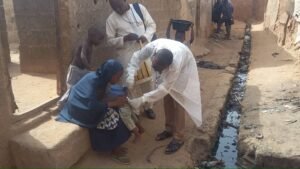
*NIMR researchers taking samples of Children
Findings: A strong safety profile and no alarming AMR trends.
However, mortality impact wasn’t directly measured—prompting SARMAAN Phase 2.
Phase 2, now underway in 11 high-risk northern states, and aims to measure the drug’s impact on under-five mortality, evaluate feasibility, cost-effectiveness, and community acceptance, and integrate with existing health platforms for long-term sustainability.

*From 2nd left: Prof. Oliver Ezechi, along with other NIMR’s researchers.
Prof. Oliver Ezechi, Team Lead and NIMR’s Director of Clinical Sciences, says, “We’re not just conducting research; we’re saving lives.
“SARMAAN is a lifeline, not a one-off intervention,” he added.
Empowering communities, creating local champions
Beyond medication, SARMAAN prioritises community empowerment.
Adding a voice, Dr Abideen Salako, SARMAAN’S Consultant Paediatrician and Study Coordinator, says, “It’s about hope.
“We’re training local mothers as health workers and data collectors, turning passive recipients into active healthcare agents.”
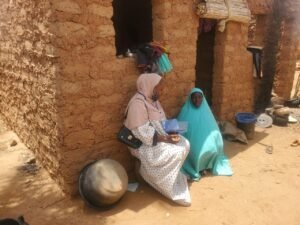
*One of NIMR researchers engaging one of the rural women on safety health issues in Tsakuwa Community.
With 1.8 million doses distributed across 82 LGAs, SARMAAN is already scaling.
In states like Kaduna and Kebbi, full rollout has begun for children aged 1–59 months. In Kano, the programme is expanding from 24 LGAs to all 44 within six months.
“Social mobilisation, community engagement, and traditional leadership are crucial,” says Mr Auwaal Saad, Deputy SMU Programme Manager.
In spite of recorded successes, SARMAAN faces notable challenges.
“Research is not yet valued in policymaking,” laments Dr Folahanmi Akinsolu, NIMR’s Assistant Study Coordinator.
Akinsolu cited some of the challenges to include weak health infrastructure, inadequate lab capacity, shortage of skilled personnel, security threats in some areas, and transporting biological samples from remote locations to Lagos.
“In some local government areas, research assistants have been attacked, hindering data collection,” he said.
Early results, growing optimism
However, Dr Imam Bello, SARMAAN 2 Consultant, noted that in spite of these shortcomings, “momentum is building”.
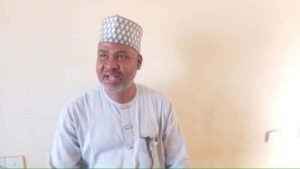
According to him, “We have collected nasal and rectal samples in over 6,000 households.
“The goal is to have 144,000 participants across all sites.
“Pilot areas like Kura in Kano show high community acceptance and low resistance trends—early signs that mass azithromycin rollout is both safe and welcomed,” he said.
Personal impact
“Before, we would lose children and feel powerless,” says Amina Ali, a local health worker.
“Now, we have hope. We are protecting our future—one child at a time.
“Infant deaths have reduced,” adds Malam Hussain Adamu, a traditional leader in Tsakuwa.
“We must all support this life-saving initiative.”

*Mallam Hussain Adamu, a traditional leader in Tsakuwa
A beacon of hope for Nigeria’s children
Experts and stakeholders agree that SARMAAN is more than a study.
It’s a transformative model for integrated child healthcare, one grounded in science, powered by community, and built for sustainability.
Through strategic partnerships, data-driven practices, and grassroots empowerment, SARMAAN aims to inform national child survival policies, complementing existing efforts such as immunisation and exclusive breastfeeding.
Each dose of azithromycin now represents more than treatment.
It symbolises a promise: that every Nigerian child deserves a chance to grow, learn, and dream. (NAN)(www.nannews.ng)
***This article was with support from the Solutions Journalism Network and the Nigeria Health Watch.
** If used, credit the writers and the News Agency of Nigeria.


